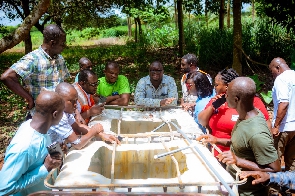 The committee members during the visit
The committee members during the visit
Steering Committee members of the Landscapes and Environmental Agility across the Nation (LEAN) the four-year project funded by the European Union have visited some sites of farmers who participated in the alternative livelihood training in the transitional zone.
The alternative livelihood training comes directly under LEAN, which is uniquely positioned to deliver transformative and long-lasting development impact.
As part of the activities of the project in the zone, some selected famers have been trained in alternative livelihoods which includes snail rearing, small ruminants and aquaculture and others.
The move is to help improve on the general livelihood of the farmers so that they can still generate income when the farms are no longer on peak seasons.
It is also to desensitize the farmers to desist from causing forest infractions that is activities which will contribute to deforestation and land degradation.
The group who visited the sites were made up of representatives from Cocobod, Forestry Commission, Green organic, Olam food ingredient, some chiefs and members implementing the project. They visited some nursery sites at Faaman (Techiman South Municipal), snailery in Offuman and a fish farm in Mesidan in the Techiman North.
The objective of the visit was to check how the participants were doing after the project have provided training, mentoring and seed capital to support these farmers with additional livelihood schemes.
Speaking to Afena Yorke of Mesidan community and a beneficiary of the Aquaculture training, he said "I am very excited to be part of this project. This is a very lucrative business I can have for a lifetime. It has enriched my life already and I can see progress although I started this about 3months ago. The catfish grow very fast and it’s been very east to adapt."
The LEAN project, which was launched on May 11, 2021, at the national level and subsequently launched at the three targeted landscapes which are the High Forest Ecological Landscape, Transitional Landscape and Savanna landscape, is expected to end in 2024.




